unit14
- 格式:pps
- 大小:4.01 MB
- 文档页数:81
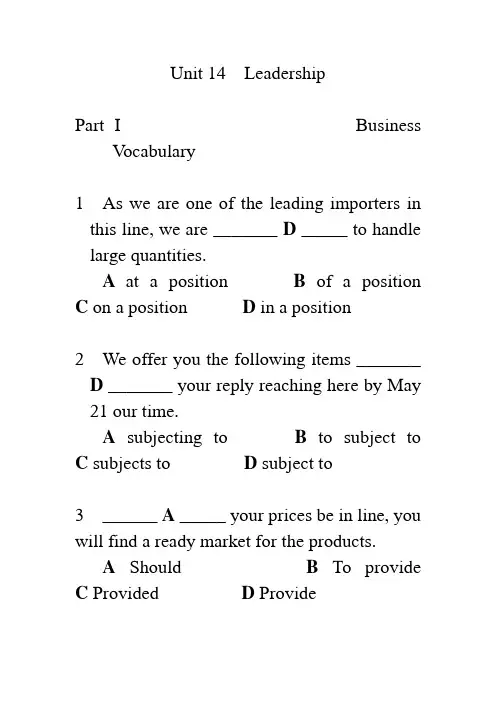
Unit 14 LeadershipPart I Business V ocabulary1 As we are one of the leading importers in this line, we are _______ D _____ to handle large quantities.A at a positionB of a positionC on a positionD in a position2 We offer you the following items _______D _______ your reply reaching here by May21 our time.A subjecting toB to subject toC subjects toD subject to3 ______ A _____ your prices be in line, you will find a ready market for the products.A ShouldB To provideC ProvidedD Provide4 We confirm our e-mail of yesterday, _______ C ________ as follows.A readsB readC which readsD which reading5 Our latest design has won worldwideB.A popularB popularityC popularlyD popularize6 Art. No. 823 enjoys the fame of wideC.A sellingB salableC salesD sell7 As the goods are __ A _ great demand we regret being unable to cover your requirements.A inB onC ofD having8 Your payment terms are Dto us.A agreeB agreedC agreementD agreeable9 We would suggest _______ B ______ your own interest that you fax us your acceptance as soon as possible.A withB inC forD at10 Their latest products are ______B ________.A on scare supplyB in short supplyC Not preparingD with abundant supply11 We cannot _________B________ our offer open for more than three days, so please fax us your acceptance immediately.A haveB leaveC remainD make12 We are _________ D ______ your letter of June 24 offering us 50 metric tons of Groundnut Kernels.A at receipt ofB on receipt forC in receipt forD in receipt of13 Some customers requested us to ______ D _______ our price because they considered it too high.A put downB get downC take downD bring down14 Great demand in the market resulted ______A_______ the increasing prices of the digital cameras.A inB fromC forD at15 _________ B ______ we appreciate your intention, we regret that we cannot entertain any fresh order.A AsB ThoughC MuchD So16 _________ B _________ we would like to supply you with the product, we are unable to fill your order.A As much asB Much asC Very muchD As17 __________ C ______ heavy commitments, we cannot accept any fresh orders.A SinceB BecauseC Owing toD As18 We are fully aware _______ A _______ the trouble you are faced with.A ofB inC atD /19 Increased productions results _____C _____ the adoption of new production method.A inB atC fromD on20 The Buyers demand that the goods _________ D _________ within a week.A must shipB should shipC must be shippedD be shippedPart II Phrase TranslationDirections: Directions: There are 20 Chinese phrases in this part. You are required to translate them into English and write down your translation on the Answer Sheet. This part totals 20 points, one point for each phrase.1 首席执行官ChiefExecutive Officer2 资本结构capital structure3 宗教价值观religious values4 语音邮件voice-mail5 信息量volume of information6 商业领导Business Leader7 现任职位present position8 个人素质personal qualities9 管理理念management style10 业绩记录trackrecord11 商业技能commercial skill12 营销战略Marketing Strategy13 决策decision-making14 现金奖励Cashreward15 年终奖end-of-year bonus16 职业发展计划career development plan17 销售代表SalesRepresentative18 股东价值shareholder value19 财富创造者wealth creator20 两位数增长Double-digit growthPart III Sentence TranslationDirections: There are 10 sentences in this part. You are required to translate them into Chinese and write down your translation onthe Answer Sheet. This part totals 20 points, two points for each sentence.1. The word “manager” has too often come to be synonymous with control.“经理”这一词总给人一种和控制相类似的感觉.2. The world will belong to passionate, driven leaders – people who not only have enormous amounts of energy but who can energize those whom they lead.世界将属于那些富有热情,干劲十足的领导人.不仅要有巨大的活力,还要能够激励他们领导的员工.3. Above all else good leaders are open. They go up, down, and around their organizations to reach people.最重要的是好领导都是开诚布公的。
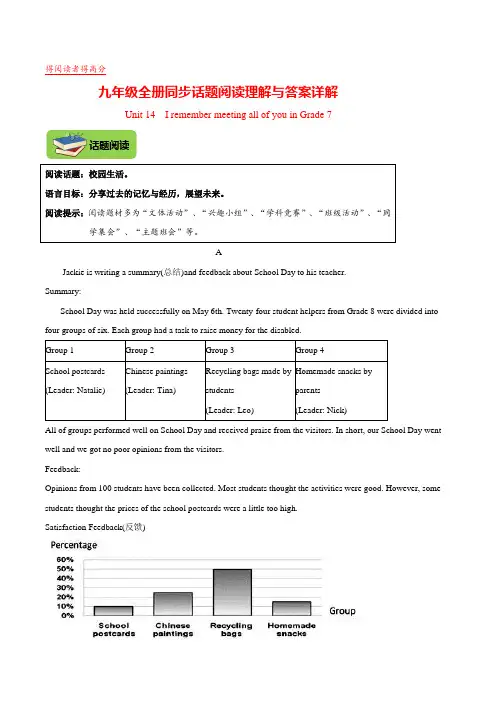
得阅读者得高分九年级全册同步话题阅读理解与答案详解Unit 14 I remember meeting all of you in Grade 7阅读话题:校园生活。
语言目标:分享过去的记忆与经历,展望未来。
阅读提示:阅读题材多为“文体活动”、“兴趣小组”、“学科竞赛”、“班级活动”、“同学集会”、“主题班会”等。
AJackie is writing a summary(总结)and feedback about School Day to his teacher.Summary:School Day was held successfully on May 6th. Twenty-four student helpers from Grade 8 were divided into four groups of six. Each group had a task to raise money for the disabled.Group 1 Group 2 Group 3 Group 4School postcards (Leader: Natalie) Chinese paintings(Leader: Tina)Recycling bags made bystudents(Leader: Leo)Homemade snacks byparents(Leader: Nick)All of groups performed well on School Day and received praise from the visitors. In short, our School Day went well and we got no poor opinions from the visitors.Feedback:Opinions from 100 students have been collected. Most students thought the activities were good. However, some students thought the prices of the school postcards were a little too high.Satisfaction Feedback(反馈)话题阅读Follow-up:Have a meeting with the headmaster about prizes for excellent student helpers.1.The text is written to ___________ .A .give a reportB .have School DayC .collect opinions from visitorsD .hold a meeting with teachers2.Which of the following is TRUE about the activities?A .Nick was the leader of Group I.B .Twenty-four students offered their feedback.C .The postcards were cheap.D .Student helpers who did well can get prizes.3.What were sold in Tina's group?A .School postcards.B .Chinese paintings.C .Recycling bags.D .Homemade snacks.4.How did the visitors feel about the activities?A .Disappointed.B .Satisfied.C .Worried.D .Surprised.5.How many students like the recycling bags according to the feedback?A .50.B .25.C .15.D .10.6.Which of the following is TRUE about the activities?A .Nick was the leader of Group I.B .Twenty-four students offered their feedback.C .The postcards were cheap.D .Student helpers who did well can get prizes.BIn American schools there is something called Home-coming Day. Many high schools and colleges with a football team have a home-coming game. This can be the most important event of the year except graduation (毕业) day. Students plan Home-coming Day for many weeks in advance.Several days before Home-coming ,students start to decorate (装饰)the school. There are signs to wish luck to the team, and many other signs to welcome all the graduates. Many people still come to Home-coming twenty or thirty years after their graduation.The members of school clubs build booths (摊位) and sell lemonade, apples and sandwiches. Some clubs help to welcome visitors.During the day people like to look for teachers that they remember from long ago. Often they see old friendsand they talk together about those happy years in school.Everyone soon comes to watch the football game. When the game is half over, the band (乐队)comes onto the field and plays school songs. Another important moment is when the Home-coming Queen or King appears. All the students vote a most popular student Home-coming Queen or King. It is a great honor to be chosen.Home-coming is a happy day, but it is not perfect unless the football team wins the game. Even if the team loses, the students still enjoy Home-coming. Some stay at the school to dance, and others go to a party. For everyone it is a day worth remembering.6.The most important event of the year in high schools and colleges is_______.A.Home-comingB.the football gameC.graduationD.winning the game7.When do students begin to do everything for Home-coming?A.The day before Home-coming.B.Many weeks before the day.C.When the guests arrive.D.Several hours before Home-coming.8.Which of the following is NOT mentioned (提及) on Home-coming Day?A.To see old friends.B.To visit teachers they remember.C.To watch the football game.D.To go home to see their family.9.Who can probably become Home-coming Queen or King?A.The teacher who is kind to the students.B.The student who is popular with the students.C.The visitor who is famous to the students.D.The player who plays best in the football game.10.What’s the best title of this article?A.Home-coming DayB.A Happy DayC.The Most Important EventD.Home-coming Queen or KingCIn order to make parents leave away from their children, Morehouse College has held a formal “Parting Ceremony(成人礼)”for the freshmen.It began on a recent evening, with speeches in the International Hall. Then the new students walked through the gates of the college-which shut up, leaving the parents outside.When University of Minnesota’s freshmen move in at the end of August, mothers and fathers were invited tohave a meeting in the classrooms, so students can meet their roommates and discuss with them about how to make their room space look nice-without adult helping.Grinnell College here, like others, has found it necessary to tell parents when they must say goodbye. After their things had been carried to bedrooms, everyone gathered in the gymnasium, students on one side of the gymnasium, parents on the other.Moving their students in usually takes a few hours. At Colgate University, a mother and father once went to their daughter’s classes on the first day and went to change her time table, recalled Beverly Low, the teacher of first-year students.Some colleges make rules to tell the time for parents to say good-bye. As of 5:30 pm on Sept. 11, for example, the parents of Pnnceton freshmen learn from the move-in schedule, “other events are planned for students only.” The rule was written on the wall. It's easy for students to point to this words and say “Hey, Mom,I think you’re supposed to be gone now”.11.What does the underlined word “freshmen” mean?A. 老师B. 学生C. 新老师D. 新生12.How many universities and colleges are talked about in the passage?A.TwoB. ThreeC. FourD. Five13.According to the passage we know____________.A. parents are proud of their childrenB. parents care about their childrenC. children can take good care of themselvesD. children can’t take care of themselves14.How does Grinnell College make parents leave their children?A. It makes parents and children stay on different sides.B. It holds Parting Ceremony for children.C. Parents are invited to have a meeting in classroom.D. It only makes some rules to remind parents.15.The main idea of the passage is ___________.A. how to welcome new studentsB. how to welcome new students’ parentsC. how to make parents leave their childrenD. how to help students start the new school year.DGraduation is a very special time. __________16___________You’ve reached the right place if you want to congratulate him or her. The following are some excellent congratulation messages at the graduation ceremony.Congratulations! I wish you all the best as you’re going to face some more difficult tasks in your life. __________17__________ In the future, you’ll meet many new friends. If someone helps you,please don't forget to be thankful to him or her!You did well! You’re such a(n) caring friend and help me a lot. __________18___________I have no doubt that the knowledge you have gained in school will be very important for your new life. __________19___________They’re not instructions but I hope you can follow them. First, don’t be afraid to ask questions. __________20___________Second, believe in yourself and be responsible for your decisions. Good luck!If you’re wondering why the last four years went so fast, you will see how quickly the rest of life goes by. Enjoy this moment because you won't get it back.阅读下面短文,掌握其大意,然后根据短文内容从下面方框的七个选项中,选择五个还原到文中,使短文意思通顺、结构完整。

Unit14 Stock Marketthe Processes of Investing Money in the Stock MarketIn the largest" city in many countries around the world, you may want to visit the stock exchange. There are stock exchanges in Paris, London, Tokyo, Toronto, and many other places. One of the largest, most famous and most important stock exchanges in the world is located in New York City. The market, as a stock exchange is sometimes called, is important to many people because they make money by investing in it. In this essay, the stock exchange itself will be explained, and the process of investing money in the stock market will be described.Stock Market证券市场In the largest city in many countries around the world, you may want to visit the stock exchange.在世界上许多国家的大城市中,你可能想去参观一下证券交易所。
There are stock exchanges in Paris, London, Tokyo, Toronto, and many other places.巴黎、伦敦、东京、多伦多和其他许多城市都有证券交易所。
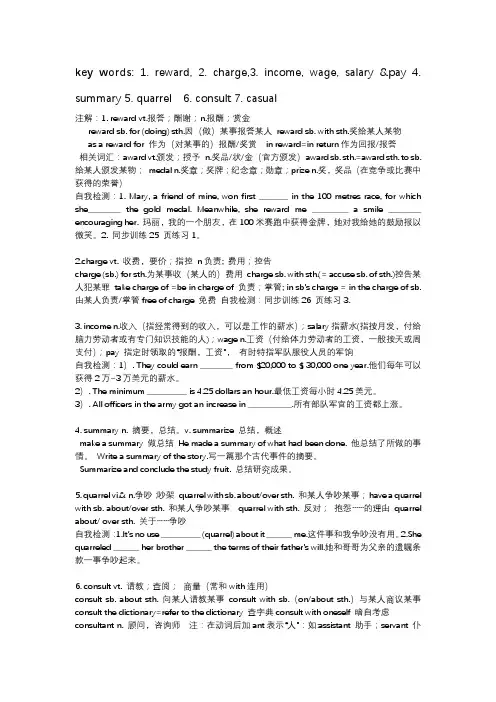
key words: 1. reward, 2. charge,3. income, wage, salary &pay 4. summary 5. quarrel 6. consult 7. casual注解:1. reward vt.报答;酬谢;n.报酬;赏金reward sb. for (doing) sth.因(做)某事报答某人reward sb. with sth.奖给某人某物as a reward for 作为(对某事的)报酬/奖赏in reward=in return作为回报/报答相关词汇:award vt.颁发;授予n.奖品/状/金(官方颁发)award sb. sth.=award sth. to sb.给某人颁发某物;medal n.奖章;奖牌;纪念章;勋章;prize n.奖,奖品(在竞争或比赛中获得的荣誉)自我检测:1. Mary, a friend of mine, won first ________ in the 100 metres race, for which she_________ the gold medal. Meanwhile, she reward me __________ a smile _________ encouraging her. 玛丽,我的一个朋友,在100米赛跑中获得金牌,她对我给她的鼓励报以微笑。
2. 同步训练25 页练习1。
2.charge vt. 收费,要价;指控n负责; 费用;控告charge (sb.) for sth.为某事收(某人的)费用charge sb. with sth.(= accuse sb. of sth.)控告某人犯某罪take charge of =be in charge of 负责;掌管; in sb’s charge = in the charge of sb. 由某人负责/掌管free of charge 免费自我检测:同步训练26 页练习3.3. income n.收入(指经常得到的收入,可以是工作的薪水);salary指薪水(指按月发,付给脑力劳动者或有专门知识技能的人);wage n.工资(付给体力劳动者的工资,一般按天或周支付);pay 指定时领取的“报酬,工资”,有时特指军队服役人员的军饷自我检测:1). They could earn _________ from $20,000 to $ 30,000 one year.他们每年可以获得2万~3万美元的薪水。
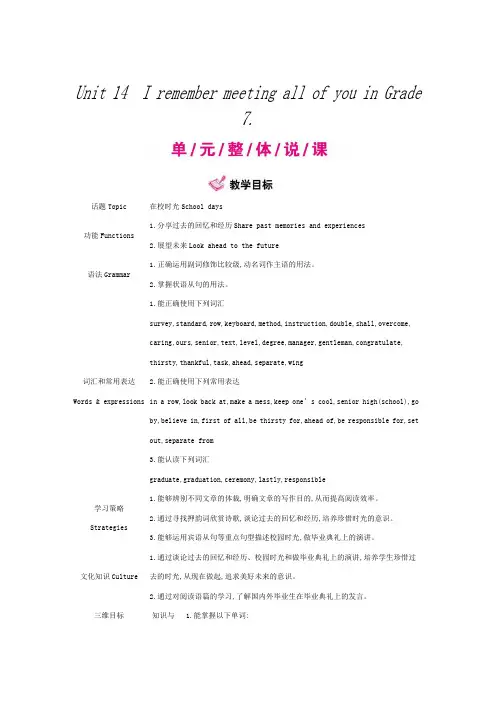
Unit 14 I remember meeting all of you in Grade7.话题Topic 在校时光School days功能Functions1.分享过去的回忆和经历Share past memories and experiences2.展望未来Look ahead to the future语法Grammar1.正确运用副词修饰比较级,动名词作主语的用法。
2.掌握状语从句的用法。
词汇和常用表达 Words & expressions 1.能正确使用下列词汇survey,standard,row,keyboard,method,instruction,double,shall,overcome,caring,ours,senior,text,level,degree,manager,gentleman,congratulate,thirsty,thankful,task,ahead,separate,wing2.能正确使用下列常用表达in a row,look back at,make a mess,keep one’s cool,senior high(school),goby,believe in,first of all,be thirsty for,ahead of,be responsible for,setout,separate from3.能认读下列词汇graduate,graduation,ceremony,lastly,responsible学习策略Strategies1.能够辨别不同文章的体裁,明确文章的写作目的,从而提高阅读效率。
2.通过寻找押韵词欣赏诗歌,谈论过去的回忆和经历,培养珍惜时光的意识。
3.能够运用宾语从句等重点句型描述校园时光,做毕业典礼上的演讲。
文化知识Culture 1.通过谈论过去的回忆和经历、校园时光和做毕业典礼上的演讲,培养学生珍惜过去的时光,从现在做起,追求美好未来的意识。
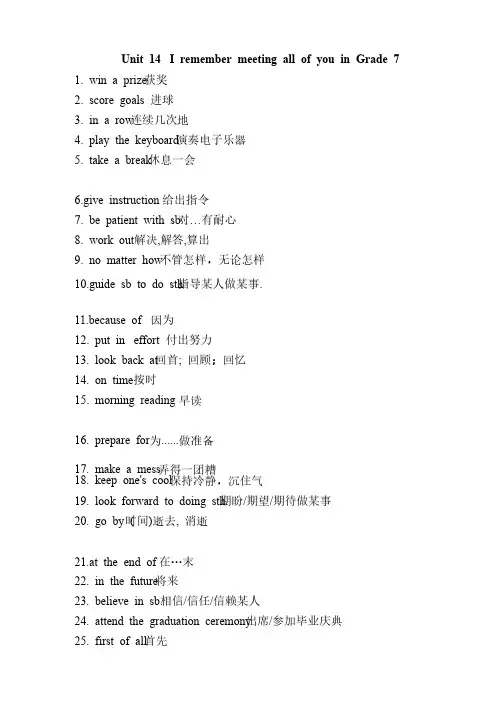
Unit 14 I remember meeting all of you in Grade 7 1. win a prize 获奖获奖2. score goals 进球进球3. in a row 连续几次地连续几次地4. play the keyboard 演奏电子乐器演奏电子乐器5. take a break 休息一会休息一会6.give instruction 给出指令给出指令7. be patient with sb. 对…有耐心有耐心8. work out 解决解决,解答,算出算出9. no matter how 不管怎样,无论怎样不管怎样,无论怎样10.guide sb to do sth 指导某人做某事. 11.because of 因为因为12.put in effort 付出努力付出努力13. look back at 回首; 回顾;回忆回顾;回忆14. on time 按时按时按时15.morning reading 早读早读16. prepare for 为......做准备做准备17. make a mess 弄得一团糟弄得一团糟18. keep one's cool 保持冷静,沉住气保持冷静,沉住气19. look forward to doing sth. 期待做某事期盼/期望/期待做某事20. go by (时间)逝去, 消逝消逝21.at the end of 在…末在…末22. in the future 将来将来23. believe in sb. 相信/信任/信赖某人信赖某人24. attend the graduation ceremony 出席/参加毕业庆典参加毕业庆典25. first of all 首先首先26. be thirsty of ... 渴望/渴求... 27. deal with ... 处理,对付处理,对付28.grow up 成长成长29.be proud of... 以... 自豪/为...骄傲骄傲30.be thankful to sb. 对某人心存感激;向某人表达感激对某人心存感激;向某人表达感激 31. ahead of ... 在之前, 在前面前面32. along with ... 连同..., 除...以外还以外还33.be responsible for ... 对...负责负责34. set out开始启程开始; 出发; 启程35. separate from sb. 与…分别/分离分离1. 获奖获奖2. 3. 连续几次地连续几次地4. 5. 休息一会休息一会6. 7. . 8. 9. 10. 11. 12. 付出努力付出努力13. 回首14. 按时按时15. 早读早读16. 为17. 弄得一团糟弄得一团糟18. 保持冷静,沉住气保持冷静,沉住气19. 20. 21. 22. 将来将来23. 24. 出席25. 26. 27. 28. 成长成长29. 以30. 31. 在32. 连同33. 对34. 开始35. 与。
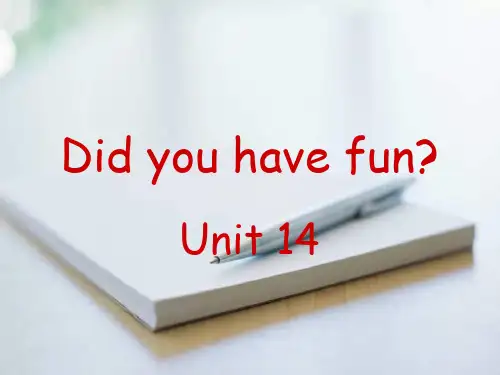
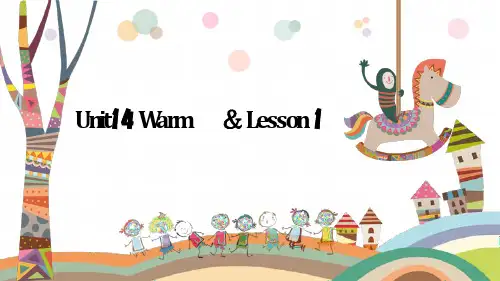
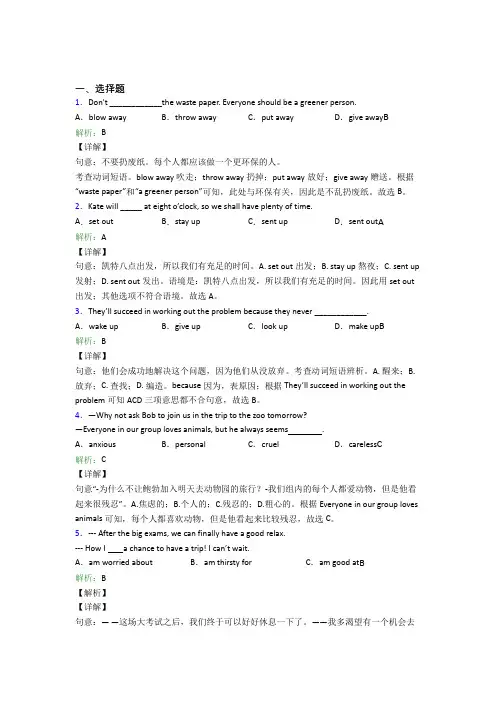
一、选择题1.Don't ____________the waste paper. Everyone should be a greener person.A.blow away B.throw away C.put away D.give away B解析:B【详解】句意:不要扔废纸。
每个人都应该做一个更环保的人。
考查动词短语。
blow away吹走;throw away扔掉;put away放好;give away赠送。
根据“waste paper”和“a greener person”可知,此处与环保有关,因此是不乱扔废纸。
故选B。
2.Kate will _____ at eight o’clock, so we shall have plenty of time.A.set out B.stay up C.sent up D.sent out A解析:A【详解】句意:凯特八点出发,所以我们有充足的时间。
A. set out出发;B. stay up熬夜;C. sent up 发射;D. sent out发出。
语境是:凯特八点出发,所以我们有充足的时间。
因此用set out 出发;其他选项不符合语境。
故选A。
3.They’ll succeed in working out the problem because they never ____________.A.wake up B.give up C.look up D.make up B解析:B【详解】句意:他们会成功地解决这个问题,因为他们从没放弃。
考查动词短语辨析。
A. 醒来;B. 放弃;C. 查找;D. 编造。
because因为,表原因;根据They’ll succeed in working out the problem可知ACD三项意思都不合句意,故选B。
4.—Why not ask Bob to join us in the trip to the zoo tomorrow?—Everyone in our group loves animals, but he always seems .A.anxious B.personal C.cruel D.careless C解析:C【详解】句意“-为什么不让鲍勃加入明天去动物园的旅行?-我们组内的每个人都爱动物,但是他看起来很残忍”。
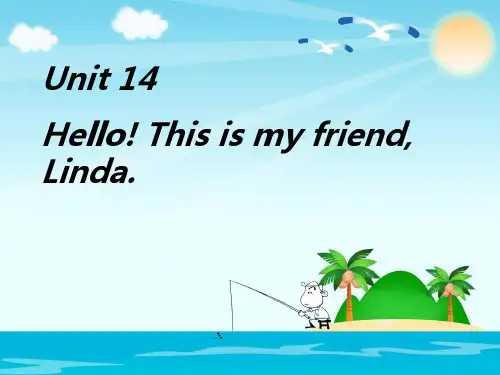
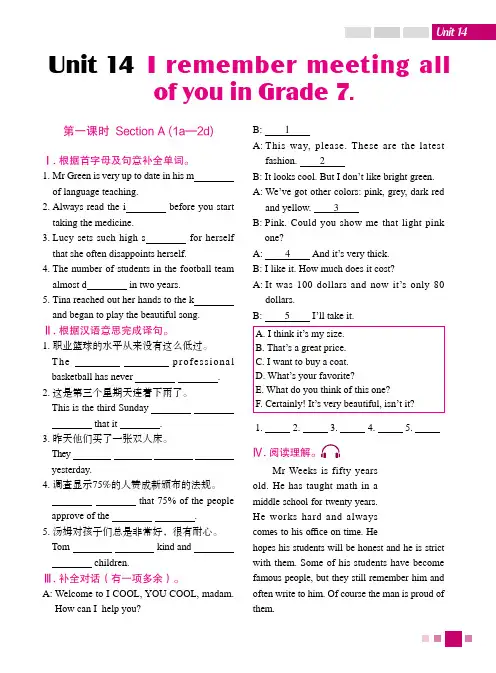
4第一课时 Section A (1a—2d)Ⅰ. 根据首字母及句意补全单词。
1.M r Green is very up to date in his mof language teaching.2.A lways read the i before you starttaking the medicine.3.L ucy sets such high s for herselfthat she often disappoints herself.4.T he number of students in the football teamalmost d in two years.5.T ina reached out her hands to the k and began to play the beautiful song.Ⅱ. 根据汉语意思完成译句。
1. 职业篮球的水平从来没有这么低过。
The professionalbasketball has never .2. 这是第三个星期天连着下雨了。
T his is the third Sunday that it .3. 昨天他们买了一张双人床。
T hey yesterday.4. 调查显示75%的人赞成新颁布的法规。
that 75% of the peopleapprove of the .5. 汤姆对孩子们总是非常好,很有耐心。
T om kind and children.Ⅲ. 补全对话(有一项多余)。
A:W elcome to I COOL, YOU COOL, madam.How can I help you?B: 1 A:T his way, please. These are the latestfashion. 2 B:I t looks cool. But I don’t like bright green.A:W e’ve got other colors: pink, grey, dark redand yellow. 3 B:P ink. Could you show me that light pinkone?A: 4 And it’s very thick.B: I like it. How much does it cost?A:I t was 100 dollars and now it’s only 80dollars.B: 5 I’ll take it.A. I think it’s my size.B. That’s a great price.C. I want to buy a coat.D. What’s your favorite?E. What do you think of this one?F. Certainly! It’s very beautiful, isn’t it?1. 2. 3. 4. 5.Ⅳ. 阅读理解。
Unit 14 Section A课文精彩回顾1. (P105, 1c) I remember scoring two goals in a row during a soccer competition.我记得在一次足球比赛中连续进了两个球。
2. (P106, 2d) Because of her, I put in more effort and my exam scores doubled.因为她,我投入了更多的努力,我的考试分数翻倍了。
3. (P106, 2d) Shall we get each of them a card and gift to say thank you?我们给他们每个人买一张卡片和一件礼物来道谢好吗?4. (P6, 3) Looking back at these past three years, I remember many things.回顾这逝去的三年时光,我想起了很多事情。
5. (P107, 3a) I’m trying to keep my cool. 我在尽力保持冷静。
典型题例1. They decided to work harder and ________ more effort after their failure. A.put in B.putted in C.put on D.be put in2. Mr. Green is looking forward ________ a big house for his family.A.to buy B.to buying C.buy D.buying重点短语回顾1. do a survey 做调查2. remember doing sth. 记得做过某事3. score two goals 得2分4. in a row 连续几次地5. junior high school 初中6. teaching method 教学方法7. be patient with sb. 对…..有耐心8. work out 解决,算出9. no matter how 无论怎样10. guide sb. to do sth. 指导某人做某事11. put in more effort 付出更多努力12. look back at 回顾13. on time 按时14. make friends 交朋友15. prepare for sth. 为……做准备16. make a mess 弄得一团糟17. keep one’s cool 保持冷静18. get good grades 取得好成绩19. at the end of …在……末20. take a break 暂停;休息21. senior high school 高中22. look forward to doing sth. 渴望做某事自我测试及解答【1】We are doing a ___________ (调查) about the health problem.【2】The article is too difficult for most s_______ high school students to understand.【3】After a longtime hard work, his English l________ has improved a lot.【4】Please read the i___________ on the bottle before taking medicine.【5】The room is much ___________ (cool) than that one.【6】Didn't you remember________ me two years ago?A.meet B.meeting C.to meet D.met【7】—Do you have any problems________ your English?—Yes, I have some difficulty ________ texts.A.with; reading B.read; study C.with; study D.in; of【8】Students stand hand in hand ________ a row.A.in B.on C.between D.of【9】We are preparing ________ art festivals.A.on B.in C.for D.of【10】I believe that you can ________ this problem by yourself.A.work in B.work out C.work on D.work at中考真题再现1. The boy is looking forward to ___ a good time after the exam.A. to haveB. hasC. havingD. have2. —Does the bus go to the beach?—No. You _______ the wrong way. You want the Number 11.A. goB. were goingC. are goingD. would go3. The boy spends at least as much time reading as he ______.A. writesB. is writing C does to write D. does writingUnit 14 Section A课文精彩回顾1. (P105, 1c) I remember scoring two goals in a row during a soccer competition.我记得在一次足球比赛中连续进了两个球。
Unit FourteenPart One StatementsComplete each of the statements with what you hear and choose A or B that explains the word or phrase in bold.1. We were planning on just having a snack and catching the early train. ( A )2. She owes her present position to having worked very hard. ( B )3. Snow was blowing across the fields and piling up against walls. ( A )4. We intended to go to Australia next year if all goes well. ( A )5. The quickest way to get here is to take the uptown express. ( B )6. She insisted on telling me every single detail of what they did to her in hospital. ( A )7. They might try to take legal action against you if you break the terms of the contract. ( B )8. I'd recognize your handwriting anywhere---it's unique. ( A )9. This firm has taken over three companies this year. ( A )10. Last week, the airline cut its overseas service by half because of a sharp reduction in traffic(B)Part Two DialoguesDialogue OneImmigration and CustomsCustoms Officer: Next. Uh, your passport please.Woman: Okay.Customs Officer: Uh, what is the purpose of your visit?Woman: I'm here to attend a teaching convention for the first part of my trip, and thenI plan on touting the capital for a few days.Customs Officer: And where will you be staying?Woman: I'll be staying in a room at a hotel downtown for the entire week.Customs Officer: And uh, what do you have in your luggage?Woman: Uh, well, just, just my personal belongings um... clothes, a few books, and a CD player.Customs Officer: Okay. Uh, please open your bag.Woman: Sure.Customs Officer: Okay... Everything's fine. Uh, by the way, is this your first visit to the country.Woman: Well, yes and no. Actually, I was born here when my parents were workingin the capital many years ago, but this is my first trip back since then. Customs Officer: Well, enjoy your trip.Woman: Thanks.Listen to the dialogue and choose the best answer to each of the questions you hear.1. What is the purpose of the woman's visit? ( C )2. Where will the woman stay during her trip? ( B )3. About how long will the woman be in the country? ( C )4. What things are in the woman's luggage? ( B )5. What other piece of information do we learn about the woman? ( C )I. Listen to the dialogue again and write T for True or F for False for each statement you hear.1. The Customs officer asks the woman to tell the purpose of her visit. ( T )2. After touting the capital, the woman is going to attend a teaching convention. ( F )3. She will be staying downtown in her parents' home. ( F )4. The officer says that it is not necessary to open her bag. ( F )5. This is not her first trip to the city since she left. ( F )Dialogue TwoSightseeing in T ownMan: So, what do you want to do tomorrow?Woman: Well, let's look at this city guide here.Man: Okay.Woman: Uh, here's something interesting. Why don't we first visit the art museum in the morning?Man: Okay. I like that idea. And where do you want to eat lunch?Woman: How about going to an Indian restaurant? The guide recommends one downtown a few blocks from the museum.Man: Now that sounds great. After that, what do you think about visiting the zoo?Woman: Oh... umm.., well...Man: Well, it says here that there are some very unique animals not found anywhere else.Woman: Well, to tell the truth, I'm not really interested in going there.Man: Really?Woman: Yeah. Why don't we go shopping instead? There are supposed to be some really nice places to pick up souvenirs.Man: Nah, I don't think that's a good idea. We only have few travelers checks left, and I only have fifty dollars left in cash.Woman: No problem. We can use your credit card to pay for MY new clothes.Man: Oh, no. I remember the last time you used MY credit card for YOUR purchases.Woman: Oh well. Let's take the subway down to the seashore and walk along the beach.Man: Now that sounds like a wonderful plan.I. Listen to the dialogue and choose the best answer to each of the questions you hear.1. Where are they planning tO go in the morning? ( B )2. What kind of restaurant do they want to visit for lunch? ( C )3. Why does the man want to visit the zoo in the afternoon? ( C )4. Why does the woman want to go shopping instead? ( A )5. How do they plan to get to the seashore at the end of the conversation? ( C )II. Listen to the dialogue again and write T for True or F for False for each statement you hear.1. The woman wouldn't like to visit the art museum first. ( F )2. There is an Indian restaurant downtown a few blocks from the museum. ( T )3. Generally speaking, women wouldn't like to see wild animals in the zoo. ( F )4. The man wouldn't like to go shopping because he has not enough money with him. ( T )5. They agree to go to the seashore and walk along the beach. ( T )Dialogue ThreeSpending MoneyJoshua: Dad. Allowance Day. Can I have my allowance?Father: Oh. I forgot about that.Joshua: Y ou always forget.Father: I guess I do. How much do I owe you?Joshua: Just $13.Father: Thirteen dollars! Why do I owe you that much? Just seems that I paid you the other day. Joshua: No. Y ou forget every Saturday, and it has been piling up.Father: Well, I'm not sure if I have that much.Joshua: Go to the bank. Y ou have lots of money.Father: Lots of money, uh? Uh, well, I think the bank is closed.Joshua: Then, what about your secret money jar under your bed?Father: Oh, I guess I could do that. So, what are you going to do with the money?Joshua: I'm going to put some in savings, give some to the poor people, and use the rest to but books. Father: Well. that sounds great, Joshua.I. Listen to the dialogue and choose the best answer to each of the questions you hear.1. How much does the father owe his son in allowance? ( B )2. Why hasn't the father given his son allowance? ( A )3. When does the father usually give his son money? ( B )4. Where does the man get money to pay his son? ( A )5. Choose one thing the boy does NOT mention about how he will spend his money. ( A )II. Listen to the dialogue again and complete the following sentences with the information you hear.1. How much do I owe you?2. Why do I owe you that much? Just seems that I paid you the other day.3. Y ou forget every Saturday, and it has been piling up.4. Then, what about your secret money jar under your bed?5. So, what are you going to do with the money?Part Three PassagesPassage OneThere Are Limits, Even to FriendshipA few months ago, I moved into a very small flat after living for years with my parents. It' s thefirst time I have ever had a place of my own and I am very fond of it, despite the lack of space. I had been in the flat only for a few days when a friend phoned and practically begged me to let him stay for a while. He explained he had lost his job recently but was sure he would find another one very soon. Since I thought it would be only for a short time, I said yes.More than a month has gone by since then and my friend showed no sign of moving out. Thereare only two small rooms in the fiat, plus the small bath-room and tiny kitchen. He has more or less taken over the front room. I don't like sharing the bathroom, either. In fact, I have discovered that I just don’t like other people living in my flat!A few days ago, I decided that enough was enough and that he would have to leave. I intended to tell him that I wanted the place to myself again, but somehow he persuaded me to let him stay longer. He still hasn't found a job and can't afford to rent a room of his own. And therejust doesn't seem to be anyone else he can stay with.Of course, I d like to help him as much as possible. He is, after all, a friend! But there are limits, even to friendship. I just don't know what I' 11 do if he is there much longer.I. Listen to the passage and choose the best answer to each of the questions you hoar.1. What change took place in the speaker's life? ( A )2. Why did the friend want to stay with him? ( D )3. Why did the speaker dislike his friend staying in his fiat? ( B )4. Which of the following statements is NOT true? ( D )5. What happened at last to the speaker? ( C )II, Listen to the passage again and answer the following questions.1. What did the speaker think about his friend's request?Since he said that it would be only for a short time he agreed to live with him.2. Why did the speaker like his small fiat?Because he lived with parents too long.3. What rooms are there in the fiat?Two small rooms, a small bathroom and a tiny kitchen.4. How did his friend stay with him?He has more or less taken over the front room and also shared the bathroom.5. How did the speaker want to solve the problem?As a friend, he wanted to help him, but there are limits, even to friendship. He didn't know what to do.Passage T woMake FriendsMaking friends is a skill. Like most skills, it improves with practice. If you want to meet people and make friends, you must be willing to take some action. Y ou must first go where there are people. Y ou won't make friends staying home alone.Join a club or group, talking with those who like the same things as you do is much easier. Or join someone in some activity.Many people are nervous when talking to new people. After all, meeting strangers means seeing the unknown. And it's human nature to feel a bit uncomfortable about the unknow n.Most of our fears about dealing with new people come from doubts about ourselves. We imagine other people are judging us, finding us too tall or too short, too this or too that. But don't forget that they must be feeling the same way. Try to accept yourself as you are, and try to put the other person at ease. Y ou'll both feel more comfortable.Try to act self-confidenthly even if you don't feel that way when you enter a room full of strangers, such as a new classroom, walk tall and straight, look directly at other people and smile.If you see someone you'd like to speak to, say something. Don't wait for the other person to start a conversation.Just meeting someone new does not mean that you will make friends with that person. Friend-ship is based on mutual liking and "give and take". They take time and efforts to develop. And there are things that keep a new friendship from growing.I. Listen to the passage and choose the best answer to each of the questions you hear.1. What is the suggested way to make friends? ( B )2. What is easy to do to make friends? ( D )3. What is it that makes us feel nervous when talking to strangers? ( A )4. How should we deal with new people according to the author? ( C )5. Which of the following statements is NOT true according to the passage? ( D )II. Listen to the passage again and answer the following questions with Y es or No.1. Can you make friends if you stay home alone? ( No )2. Can you make friends if you avoid joining someone in some activity? ( No )3. Is it right to walk tall and straight, look at other people and smile while entering a roomfull of strangers? ( Y es )4. Is it fight that you start a conversation when you see someone you'd like to speak to?(Y es)5. Is it likely that people feel uncomfortable about the unknown? ( Y es )Passage ThreeRailways in BritainIn Britain railways are owned by the State. That means that everybody owns them---or perhaps that nobody owns them. In general train services in Britain are very good, especially on express inter-city lines. However, they are quite expensive unless you can get a reduction. The easiest way to get a reduction is to get a return ticket. If you buy a day-return (so that you go and come back on the same day) you can save 45 % of your fare. Other return tickets are available for travel at weekends or mid-week. If you cannot buy a return, you must buy a single. In Britain tickets (except some special reduced fares) are valid on all trains. It is not necessary to pay an extra fare to travel on an express.If you want to find out details of train journeys you can phone the information office at the station in most towns or a travel agent. They will tell you about reservations and whether it is necessary to change trains in your journey.Y ou must buy a ticket before you can go on to the platform at British stations. The ticket collector will want to check your ticket and will sell you a platform ticket if you do not want to travel but only want to say goodbye to a friend. Y ou must keep your ticket safe because it will be checked when you arrive, and probably during the journey as well by the guard. All trains in Britain have first and second class carriages; if you want to travel first class you have to pay about 50% extra for your ticket. There are smoking and non-smoking compartments or carriages on all trains, and most inter-city trains have buffet or restaurant cars.I, Listen to the passage and choose the best answer to each of the questions you hear.1. Who owns railways in Britain? ( D )2. How are train services in Britain? ( B )3. How can people get a reduction? ( A )4. Where can you get information about reservation? ( C )5. Why do you have to keep your ticket safe during your journey? ( A )II, Listen to the passage again and answer the following questions.1. What kind of ticket makes you save 45% of your fare?A day return ticket.2. Why is it not necessary to pay an extra fare to travel on an express?Because in Britain tickets are valid on all trains.3. What do you do if you want to say a goodbye to a friend on the platform?To buy a platform ticket.4. How much do you have to pay if you want to travel first class?To pay about 50% extra for your ticket.5. On what kind of train are smoking and non-smoking compartments or carriages available?On all trains.Part Four idioms and ProverbsI. In this part, you will be presented with ten sentences. Listen carefully and write them down.1. Better be an old man's darling than a young man's slave.2. Between two stools you fall to the ground.3. The beaten road is the safest.4. Blood is thicker than water.5. A bully is always a coward.6. Burn not your house to fright the mouse away.7. Beggars must not be choosers.8. Best is cheapest.9. Busiest men find the most time.10. Better be sure than sorry.II. In this part, you will hear ten sentences. In each sentence there is one idiom that is given below. Listen and guess its meaning from the context.Script:1. Could we postpone our meeting until tomorrow? I expect to be in and out of the office mostof the day today.2. Can you help me with this problem? I've been beating my brains out with it, but I just can'tsolve it.3. I know you're worded about your job interview, but don't get bent out of shape. Y ou'll dojust fine.4. I'm really behind with my project. Can you help me? I'm afraid I bit off more than I couldchew!5. Don't say anything to Bob unless you want the whole office to know. Bob's quite ablabbermouth.6. Don't forget to bring your boom box to the picnic!7. The discussion lasted many hours. The bottom line was that the XYZ Company isn't forsale.8. I understand you have a job interview tomorrow. Break a leg!9. Joe broke his mother's heart when he dropped out of school.10. The cheapest tickets for the concert cost 25 bucks. Do you still want to go?Keys:1. be at and away from a place during a particular time2. try very hard to understand or do something3. needlessly worried about something4. take responsibility for more than one can manage5. a very talkative person---especially one who says things that should be kept secret6. portable cassette/CD player7. the most essential information8. Good luck!9. make someone feel very disappointed/discouraged/sad10. dollar(s)Part Five Exercises for HomeworkI, Short ConversationsIn this part, you will hear ten short conversations. Each of them is followed by a question. After the question, you are supposed to choose a correct answer from the four choices.1. W: Wow, your model plane is so beautiful. I guess I'm talking to the big winner.M: Oh, no. I had it made for demonstration only.Q: What can we learn about the man's model? ( C )2. W: Y our eyes look terrible, what's wrong?M: Oh, I stayed up too late last night.Q: What's the man's problem? ( A )3. M: Hi, Betty. I can see you are walking to school. What happened to your bike?W: It's being repaired.Q: What's wrong with Betty's bike? ( D )4. W: I'm not sure if John can win the game this time.M: Y es, he still has trouble with his left arm.Q: What can we infer from the conversation? ( B )5. M: Helen sang a wonderful song at the party last night.W: She is the best singer in our class.Q: What can we infer about Helen? ( B )6. W: We are to meet with our guests from Paris next week, fight?M: It's the week after the next, to be more exact.Q: What does the man mean?(A)7. W: Jack, every boy is helping me in the kitchen. Would you like to make the salad?M: I have a better idea. I'll go to the small shop to buy it instead.Q: What does the man mean? ( C )8. W: I have trouble concentrating in the morning if I don't drink a cup of coffee at breakfastM: Me, too. The only difference is that I have red tea.Q: What does the man mean? ( C )9. M: I think there won't be any tickets left.W: But if we don't try our best, we'll miss the greatest concert of the year.Q: What does the woman mean? (A)10. W: I think this T-shirt is not a very good choice.M: Y es, it's expensive. Besides, I'm sure the color will fade when you wash it.Q: What does the man mean? ( A )II. PassagesPassage OneLiving Outside LondonMany people who work in London prefer to live outside it, and to go into their offices, factories or schools every day by train, car or bus, even though this means they have to get up earlier in the morning and reach home later in the evening.One benefit of living outside London is that houses are cheaper. Even a small flat in London without a garden costs quite a lot to hire. With the same money, one can get a little house in the country with a garden of one's own.Then, in the country one can be free from the noise and hurry of the town. Although one has to get up earlier and spend more time in trains or buses, one can sleep better at night, and during weekends and on summer evenings, one can enjoy the fresh, clean air of the country. If one likesgardens, one can spend one's spare time digging, planting, watering and doing a hundred and one other jobs which are needed in the garden. Then, when the flowers and vegetables come up, one has the reward of a person who has shared the secrets of nature.Some people, however, take no interest in country things; for them, happiness lies in the town, with its cinema and theatres, because of shops and busy streets, dance-halls and restaurants. Such people would feel that their life was not worth living if they had to live outside London. A walk in one of the parks and a visit to the sea every summer is all the country they want.Listen to the passage and answer the following questions.1. What is meant by living outside London and going to offices, factories or schools every day bytrain, car or bus?They have to get up earlier in the morning and reach home later in the evening.2. What can you get with the same money as you spend on a small flat in London?A little house in the country with a garden of your own.3. What are benefits of living in the country?1) be free from the noise of the town;2) sleep better at night;3) enjoy the fresh, clear air of the country;4) do some gardening.4. Why do some people take no interest in country things?For them happiness lies in the town because in the town there are cinemas and theatres,shops and streets, dance halls and restaurants.5. Generally speaking, what do city people want for the country?A walk in one of the parks and a visit to the sea every summer.Passage T woEating HabitsOur eating habits are very important for good health and a strong body. There are times when most of us like eating sweets and ice cream better than meat and rice. Sweets and ice cream are not bad for us if we eat them at the end of a meal. If we eat them before a meal, they may take away our appetite. It's important for us to eat our meal at regular time each day. When we feel worried or excited, we may not want to eat. A long time ago, in England, some judges often decided whether a man was telling truth by giving him some dry bread. If the man could not swallow the bread, it meant that he wasn't telling the truth. Though this seems strange and foolish, they thought it was an excellent way of finding out truth. A man who is worrying something has difficulty in swallowing anything dry, because he loses his appetite.Listen to the passage and choose the best answer to each of the questions you hear.1. When is it good for us to eat sweets and ice cream? ( B )2. At what time shall we have our meal every day? ( A )3. What did the judges in England think if a man didn't tell the truth? ( C )4. What kind of person may not want to eat? ( D )5. What can we learn from the passage? ( A )Passage ThreeThe BullOnce upon a time two young men were spending some time in the country. One day, while taking a walk together, they crossed a large field. Suddenly a bull appeared and began to chasethem. They were naturally very much frightened. The men began to run, but the bull continued to chase them. Finally, one of the men climbed a tree and the other jumped into a large hole. Soon, however, the man who had jumped into the hole came out again. Immediately, the bull chased him back into the hole. Soon, the man came out of the hole again, and the bull chased him right back This went on for five or six times.Finally the man in the tree, who was now very angry, cried to his friend in the hole: "Y ou fool! Stay in that hole for a while. Otherwise, this bull will keep us here all day."As he jumped back into the hole again, the other man said: "That's all fight for you to stay, but there happens to be a bear in this hole."Listen to the passage and write T for True or F for False for each statement you hear.1. One day, two young men were taking a walk in a large field. ( T )2. When the bull appeared and began to chase them, they all jumped into a hole. ( F )3. When the man came out of the hole, the bull stopped chasing him. ( F )4. The man jumped in and out of the hole at most three times. ( F )5. The man jumped out again and again, because there was a bear in the hole. ( T )III. A Story for RetellingHere is a funny story. Listen and retell it.A Math ProblemThere was once a millionaire who loved money more than anything else in the world. He didn't know exactly how much he had. So he took on a little girl to count all his money for him.It took the little girl six days to count all the money. When she told the millionaire that he had forty- two million dollars, he was wild with joy and asked, "How much pay do you want?" He thought that because she was only a child, he could cheat her into taking a very small amount.The little girl said, "Well, I worked for six days, so I think you ought to pay me for six days Give me two pennies for the first day. Each day after that, just give me the amount you gave me the day before, multiplied by itself'.The millionaire thought that in this way he would only have to give her a very few dollars. What a foolish little girl! So he immediately had his lawyer write up a contract, fearing that she would change her mind.On the first day, the millionaire paid her two pennies, and on the second day, two pennies times two pennies, four pennies. Each day after that, he gave her the number of pennies he had given her the day before, multiplied by itself. And by the sixth day, the foolish millionaire had to give the clever little girl all his money.How is it that the little girl could have all the greedy millionaire’s money? If you’re interested in it, you may try to work out this math problem.。
Unit1TheFourthofJulyThefirsttimeIwenttoWashingtonD.C.wasontheedgeofthesummerwhenIwassupposedtostopbeingachild.Atl eastthat ’swhattheysaidtousallatgraduationfromtheeighthgrade.MysisterPhyllisgraduatedatthesametimefromhighschool.Idon’tknowwhat shewassupposed stopbeing.Butasgraduationpresentsforusboth,thewholefamilytookaForthofJulytriptoWashingtonD.C.,thefabledandfamouscapitalofourcountry.我第一次到华盛顿的时候是初夏那时我想我不应该再当一个孩子。
至少这是他们在八年级的毕业典礼上对我们说的。
我的姐姐菲利斯在同一时间从高中毕业。
我不知道她应该不再当一个什么。
但当作是送给我们俩的毕业礼物,我们全家在国庆日前往华盛顿旅游,那是传奇而著名的我国首都。
ItwasthefirsttimeI ’deverbeenonarailroadtrainduringtheday.WhenIwaslittle,andweusedtogototheConnecticutshore,wealwayswentatnightonthemilktrain,becauseitwas cheaper.这是我第一次真正意义上在白天时乘坐火车。
当我还小的时候我们总是在夜晚乘坐运奶火车去康涅狄格海岸,因为它更廉价。
Preparationswereintheairaroundourhousebeforeschoolwasover.Wepackedfo rtwoweeks.Thereweretwolargesuitcasesthatmyfathercarried,andaboxfilledwit hfood.Infact,myfirsttriptoWashingtonwasamobilefeast;Istartedeatingassoon aswewereensconcedinourseats,anddidnotstopuntilsomewhereafterPhiladelphia .IrememberitwasPhiladelphiabecauseIwasdisappointednottohavepassedbytheLi bertyBell.学期还没结束前家里就开始忙着准备旅行的事。
What do you want to pack when you go to American?
新课导入vacations旅游必备Have you seen my..?课程目标:能用英语表达自己对一个景点一个地区的喜好能用英语表达自己对音乐的喜好。知识与能力:能用比较流利通顺的语言讲述身边发生的事。情感态度和价值观:通过本单元的学习增强大家的综合交际能力。
学习目标•重点词汇clean out 清除;打扫干净in a minute 过一会儿on the music scene 在音乐舞台上in the last twelve months在过去的十二个月里be sure to do sth. 确定做某事be off 离开;走开beach towel 沙滩巾turn off 关闭
重点难点•难点1.must 和have to的区别;2.现在完成时。What are the three important things to pack when you go on a city vacation?
地图册1aNow Listen
Click to it1b__packed the camera __watered the plants__locked the windows __bought a travel guidebook__bought a street __packed the beach towels
Listening1bHave you bought a travel guidebook yet?Yes, I have
bought one.
1c1.
Have you packedyet?
你打包了吗?pack v.pack sth. (up)into… 整理行装pack clothes into a trunk把衣服装进衣箱内pack into塞进、挤进(某一地方或某一段时间)
Explanation Crowds packed into the cinemas on a rainy day. 在雨天, 一大群人挤进电影院。She managed to pack a lot of sightseeing into the short time she had in London. 她在伦敦,逗留的短短时间中,紧凑地安排了一连串的观光活动。2. Have you wateredthe plants yet? 你浇了这些花草了吗?water此处为动词,浇浇水,洒洒水之意。water the lawn / the plants / the streets 洒水于草地(花木,街道)上water the horses 饮马Now Listen
Click to it2aListening answers
4. M5. M1. T2. T3. T6. T2aNow Listen
Click to it2bHave you fed the cat yet? ___What about your bike? ___Are you ready, Tina? ___Have you turned off your radio? ___
5
612
Listening answers2bNo, I haven’t learned it well.
Are you
ready ,Tina?
2c1. I haven’t cleaned out the refrigerator yet.
我还没有把冰箱清除干净。clean sth. out 打扫某物之内部,扫除某物的尘土等。It’s time you cleaned your bedroom. 现在该是你打扫卧室的时候了。clean sth. up 清除罪犯和不道德分子,整顿(某事物)The mayor has decided to clean upthe city. 市长已决定要整顿市政。clean sth. down 清扫,擦干净clean down the walls 把墙上的尘土扫下2. I’ll do it in a minute. 我马上就做。in a minute, soon 立刻I’ll come downstairs in a minute. 我马上下楼。in the minute, exactly 一分不差,准确地The train arrived at 5 o’clock to the minute. 那班列车在五点整到站。the minute that, as soon as 一……就……I’ll give him your message the minute that he arrives. 等他一到,我就把你的信给他。3. Are you ready, Tina? 你准备好了吗,Tina? ready for sth. / to do sth.准备就绪的ready for work为工作准备就绪get ready for a journey作好旅行准备be ready to start准备出发Grammar现在完成时的用法现在完成时表示过去某时发生的行为对主语目前产生的影响。即用过去发生的某个行为来说明现在的某种情况。
We are good friends. (现在的情况)I knew him in 1997.(过去的动作)现在完成时的三种基本用法:1、未完成用法。表示动作或状态开始于过去,一直延续到现在,可能继续发展,也可能刚刚结束。
He has beenin the army for ten years.I havestudied English since 1980.He haslived here all his life.a. be, live, study都是延续性动词。b. 常用的时间状语:since…, for…, in the past few years, so far,all his life.2、反复性用法,表示过去到现在这段时间内反复发生的动作。I have been tothe city twice this week.I haveoften wondered where she gets her money all these days.
这种用法从时间上与现在发生了联系。3、完成性用法,表示动作或状态到说话时已经完成,通常所产生的结果把过去的动作和状态和现在联系起来。
He has gone to Shanghai.他已经去了上海。(结果:他已不在这儿)---___ the sports meet might be put off.---Yes, it all depends on the weather.A. I’ve been told B. I’ve toldC. I’m told D.I told“被告知”是过去的事,对现在的影响是“我已知道”。The price ___, but I doubt whether it will remain so.
A. went down B. will go downC. has gone down D. was going down表示已发生的动作All the preparations for the task__, and we’re ready to start.A. completed B. completeC. had been completedD. have been completed过去的动作“完成了准备工作”,对现在的影响是“现在已准备出发了”。My dictionary ___. I have looked for it everywhere but still ___ it.A. has lost; don’t findB. is missing; don’t findC. has lost; haven’t foundD. is missing; haven’t found--Where ___ the recorder? I can’t see it anywhere.
--I ___ it right here, but now it’s gone.A. did you put; have putB. have you put; putC. had you put; have putD. were you putting; have putThe CCTV has been broadcasting English programs ever since 1977.
1977now